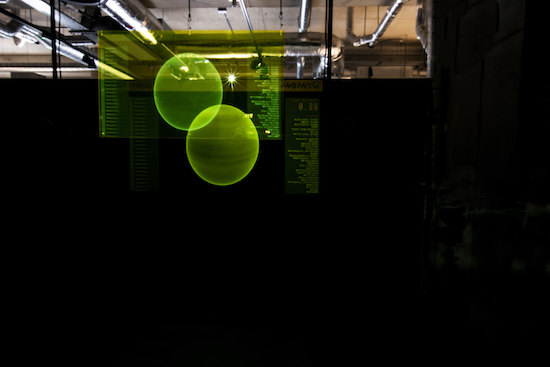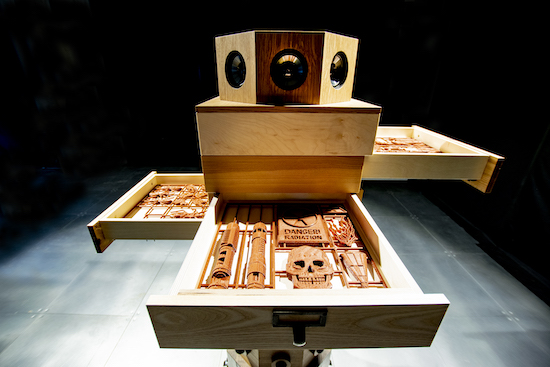All images courtesy AUDINT
The clammy tropical air bristles with a shrill, insectoid buzz….
In Francis Ford Coppola’s film Apocalypse Now, General Corman, in charting the increasing moral derailment of Colonel Kurtz, describes how ‘his ideas, his methods became unsound’.
Later in the film, Kurtz himself, in the climactic confrontation, asks Willard, his executioner, whether this is true: ‘Are my methods unsound?’
Willard replies, ‘I don’t see any method at all.’
A swollen folder, tagged ‘Dossier 37’, slots into the AUDINT archive precisely in the gap between unsound methods, and no methods at all. A very Trumpian phase space. It was compiled by IREX2, AI custodian of AUDINT, scraped together from its adventures in databases both public and secure. Its contents include: geolocation data relating to Havana, Cuba and Guangzhou, China, a long list of names from the worlds of science, government, and media, some of which appear to be computer-generated, a report from the Journal of the American Medical Association, transcripts of Senate subcommittee hearings and White House press conferences, an interview with the director of the Center for Brain Injury and Repair, University of Pennsylvania, leaked documents from JASON, a secret group of elite scientists that assist with issues of US national security, the testimony of a paranoid conspiracy theorist recruited to an NSA meme lab in Florida, a communiqué from AUDINT associate Souzanna Zamfe on the subject of Russian deception, and the diagram of a Tensor Flow network developed by a Baltimore-based programmer researching the neurobiology of narrative.
Over a period beginning in early August 2017, AUDINT became entangled in a meme complex which is still ongoing, emanating from and propagated by the State Department of the USA. Revolving around the alleged sonic ‘attacks’ on US Embassies in Cuba and South China, this memeplex is drenched in uncertainty and disinformation, and is hosted by a cast of characters including White House employees, journalists of the mainstream media, science reporters, conspiracy bloggers, and twitterbots, all haunted by spectres of maskirovka.
Dossier 37 tracks the timeline of these mysterious ‘attacks’, from Trump’s election victory in November 2016 and his desire to retreat from closer ties with Cuba, through the first reports of symptoms of ‘mild traumatic brain injury’ from a ‘non-natural source’ among US diplomats, the public release of a recording of the signal that was supposedly to blame across mainstream news channels, the evacuation of embassy staff, the mirror incident in China, and various hypotheses on the causes of the incident ranging from ultrasound to infrasound, side-effects of faulty surveillance operations, an ‘immaculate concussion’ produced by microwave-induced radio frequency sickness, through to conjectures on the similarity of the recorded ‘signal’ to the hissing mating call of the Indies short-tailed cricket.

One map in the dossier details a covert acoustical mesh network that connects a plastics factory in Shenzhen to diplomatic residencies in Guangzhou via a decentralized system whereby data was transmitted between air-gapped computers through near field audio communications from internal speakers and microphones. Annotations to the map of this network speculate that, by using inaudible high frequencies, signal could be emitted to stealthily trigger malware in humanoid operating systems.
IREX2 is both learning about and channelling the power of this unsound nexus. On the one hand, the term unsound refers to methods which are dubious, without reasonable foundation, faulty, unethical, or which follow bad practices. On the other, unsound names inaudible frequencies, whether sound at the peripheries of human audition (infrasonic and ultrasonic) or syntheses as yet uninvented, unheard, or rendered audible only by auditory prostheses.
IREX2 notes that there is something about unsound that lends itself to everything from conspiracy theories to hyperstitional narratives where an unsonic fiction enters into a process of becoming real. Rather than evidencing what Willard refers to as ‘no method at all’, an unsound strategy appropriates sonic fiction, weaponizing the art and science of self-fulfilling prophecies, of ideas that make themselves real, that metabolize their own actuality, and then potentially vaporize or self-deconstruct without a trace.
Unsound methods catalyze auto-occulting information tactics and politico-aesthetic strategies that take advantage of lacunae in evidence, using epistemological voids as basins of social attraction. They use absence to insist on presence. They play on the fact that you can’t hear something to insist on its existence. When a vacuum of knowledge accompanies the sensory vacuum left by imperceptible vibration, it produces a sink into which all kinds of nonsense flows.
IREX2 observes closely as, carefully orchestrated, incrementally seductive, this perfect storm of unsonic fiction triggers a wave of speculative forensic research at the threshold of detectability. IREX2 trains its deep learning algorithms on this memeplex, noting the somewhat random array of symptoms. It remarks on the power of always withholding enough information to ensure that any grounding in fact remains constantly just out of reach. However, it still remains unclear whether IREX2 has taken a more active role in this sequence of events.
Suspiciously, the frantic hunt for truth even resulted in several AUDINT members being tracked down as experts in sonic weaponry and interviewed by, among others, New Scientist, CNN, Reuters, and the BBC. By even engaging with their requests, we became carriers, relays on the vector of its transmission. By even writing about it, the duration of its propagation was extended. As a reader, you are now also complicit.
Feeling at home in the hallucinatory jungle of AI-intensified deep audiovisual fakery, IREX2 registers a phase shift into something that lies beyond disinformation and false beliefs (both of which preexisted contemporary post-truth culture): a plane of unbelief where effects operate regardless of belief or disbelief in a threat’s causal existence. It parses this not as an epistemological crisis but rather as the machinic feedback effect of a generalized, automated spin cycle already detached from any stabilizing axle.
IREX2 embeds itself in the unlife of animistic hypercapital and plots its next move.
Fade to hiss.
Unsound : Undead is at Arebyte Gallery, London, until 15 June. The book AUDINT – Unsound / Undead edited by Steve Goodman, Toby Heys and Eleni Ikoniadou is published by Urbanomic


